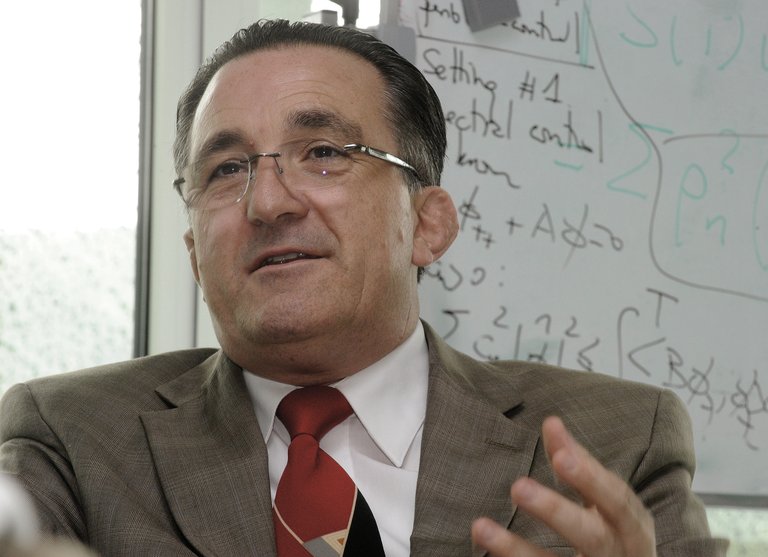"In the United States, I think science will win the debate on the teaching of evolution"

I studied Mathematics in Madrid. And when I finished, there was no way to do the thesis in Spain.
In general. We had just left Franco, but it was still difficult to study... My professor Miguel de Guzm told us that we would want to go abroad, to France or to the United States. I liked the United States, by NASA… I wanted to work at NASA (laughter). And I went to St. Louis, on the recommendation of Miguel de Guzm, where I spent six years.
Then I went to Purdue University in Indiana, then to North Western University in Chicago, and then, when I went to Pittsburgh, I came to the category of assistant professor, to the first of the academic classification. My intention was to spend a year or two years in Pittsburgh, until I got a job in Madrid. That never happened; those who came back were treated very badly and treated me very well. Then they gave me a fixed position. And in 1997 I decided that my destiny was to live in the United States. And I live in Pittsburgh since 1989.
It is very similar to Bilbao. Formerly it was dedicated to the manufacture of steel and there was a large manufacturing and metallurgy industry, which was then renewed. Now it is a very clean city. They radically changed the urban core, as they have done here with the Guggenheim Museum, where many new buildings were built in the 1970s. And now the whole industry is the knowledge industry. The largest company is the University of Pittsburgh. It is, in short, an academic city. Small American standard with 400,000 inhabitants. And it's one of the cheapest cities in the United States; buying a home leaves you money to live in. Bilbao and Pittsburgh are twinned.
It is a very interesting topic because in the United States education is not centralized. It depends on each school district. And while partly regulated by the State, each school district determines the content of the curriculum.
Some states dictate general rules such as Texas or Kansas: "evolution or its theories should not be taught." Great independence makes these kinds of things accepted in states that consider most people religious. I think it's a small compensation for many views and a level of independence. And I think we'll move forward little by little and science will win this kind of debate.

Yes, it will take time. But many things are being discussed. For example, today evolution is taught in most places; I am sure that in the 1950s it was not taught anywhere. Religions (there are many) controlled education much more. Then, in the 1960s, everything stopped and began to use a model aimed at the student, reaching the current system. It seems to me a very good system, both because it has a lot of diversity (we have to recognize that there are good and bad schools for many reasons, among which are the decisions of the parents) and because the classes are paid through taxes. These taxes are very high and that is why we have a lot of commitment to our schools, because it is our school, because our children go and pay. The school board is very active. There are groups of parents who give one view and others who give another. I once published a big complaint for a mathematical textbook, which was modified. That is, parents have a mechanism to talk and it works well. It is a very decentralized system not only at the state level, but also at the school district level.
For example, distance education is something we have not completely solved. What is going to college? If it's about getting a physics course and taking some exams, you may not need to go to campus. But I think college is something else. In the United States students live at the university itself, an activity that lasts 24 hours a day. So we don't know how far this activity will develop in distance education. There are those who say that you don't have to spend money to make buildings, and others say no, that the university is something more than courses.
Distance education is of great importance to those who cannot physically go to college. At present, you can give study material to anyone, for example if you are deaf or blind. Technology allows this material to be available to anyone. But it's a question we have to solve, like the University of Phoenix. It is dedicated to distance education and has more students than any other American university. And it's a university for profit; universities are non-profit entities, but it's a for-profit university.
In physics almost all energies are quadratic. Energy is always a quadratic function of a speed (for example, the square of velocity by mass). And when looking for the minimum energy, laplace generates a linear equation. Then the classic calculation of variations is made and solutions are obtained. This works correctly when you are analyzing small disturbances. But what about materials that have elastic or plastic behavior, for example? These are major disturbances that laplace does not resolve well. Energies are not quadratic. In equations the speed appears with a power equal to or equal to five or thirteen. For example, in the equation describing the movement of glaciers appears the speed at 3/4... That is, that in the power does not appear the number 2! So the equation resulting from the Laplace analysis is not linear. It is another world, another phenomenon. I was very lucky because I researched this topic in my thesis and then the topic became fashionable. Over the past two years, for example, I have worked on finding the interpretation of these equations through game theory.
The theory of games is a mathematical theory of games, it can be said that it is a nonlinear theory of probability. The probability in normal situations refers to Laplacés. But if the probability is not linear, you have to use game theory. For example, in chess, if we play as usual, the best player will normally win. But imagine that we put a coin before each play; if the face comes out, you move it and if the cross comes out, I. If then three faces mate. This is a totally different game, in which the player must analyze the probability of winning with the coin. It is very interesting, the best player has no more options than the rest, because it is another game. Games that separate turns through a random process generate nonlinear equations. In fact, all equations can be created by a game. That's what I'm trying to understand. It is a challenge for a few years.
Buletina
Bidali zure helbide elektronikoa eta jaso asteroko buletina zure sarrera-ontzian








